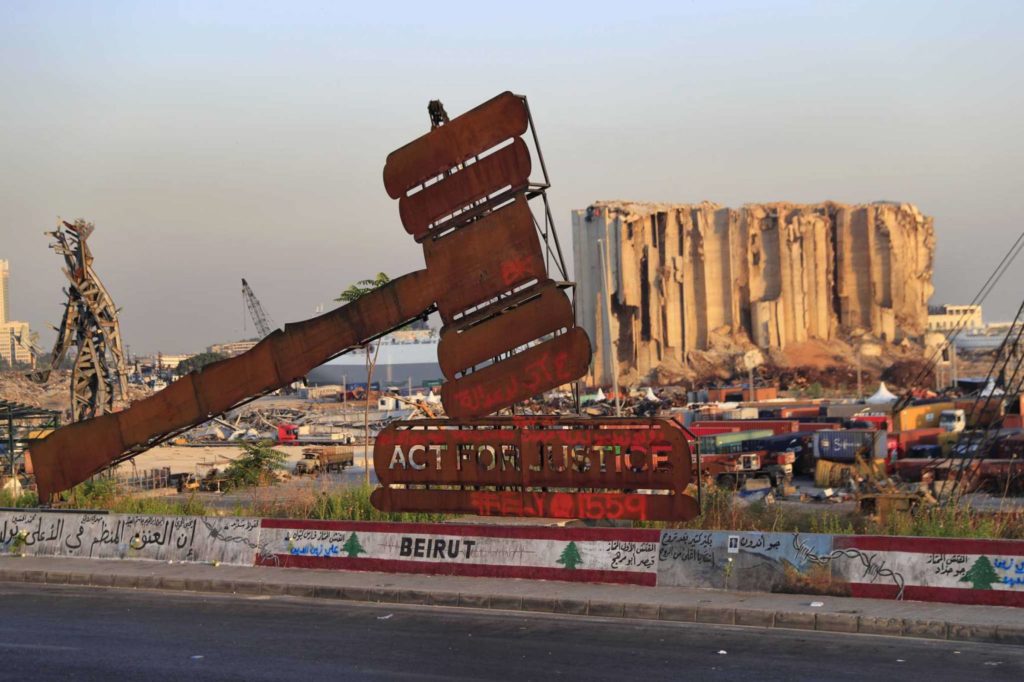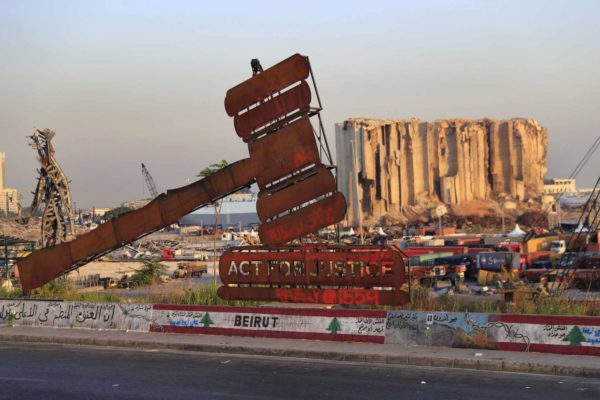By Raghida Dergham
A combination of smart western sanctions and much-needed funding from key Arab states is urgently needed

One of the prevailing notions at last week’s Manama Dialogue, an international security summit that takes place in Bahrain every year, was that Lebanon’s economic and political crisis is a domestic one. Few were willing to blame Hezbollah, the Iran-backed Lebanese proxy, or the Iranian regime itself for the Arab country’s myriad problems.
This sort of thinking runs contrary to the evidence on the ground. One need only consider Hezbollah’s insistence on removing Tarek Bitar, the judge investigating last year’s Beirut Port explosion that killed more than 200 people, injured thousands and left hundreds of thousands homeless. Or for that matter, all the political reforms that the group, which has sizeable representation in Parliament, has vetoed over the past year.
In truth, all of Hezbollah’s key tactical and strategic decisions are made by its masters in Tehran. For this reason alone, it is clear that the Iranian regime is at the root of Lebanon’s crisis. While the country’s politicians are party to these decisions – presumably for the sake of their own political self-preservation – Lebanon has been drawn further and further into Iran’s orbit.
The West doesn’t seem keen to talk about Tehran’s interference in the Arab world because it is too busy trying to strike a deal with the regime to put a lid on its nuclear weapons programme. Tehran has escaped accountability by exploiting the West’s prioritisation, even as the regime deepens its alliances with the superpowers in the East. Importantly, it finds ways to drive a wedge between Lebanon and some of its fellow Arab countries.
A case in point is the controversy surrounding Lebanese Information Minister George Kordahi, who defended the Iran-backed Houthi rebels in the ongoing war in Yemen in an online media interview broadcast last month. His statements were explosive enough to make some Gulf states recall their diplomats from Beirut. To the Iranian regime, it must have appeared as if it won a crucial battle for influence against its Arab rivals.
The anger in the Arab world over Hezbollah’s armed intervention in Lebanon’s domestic affairs is justified. After all, Lebanon is a founding member of the Arab League. Its people are Arab, not Iranian or Persian. Its language is Arabic. Its predominant social values are far removed from the doctrines and traditions of the so-called Islamic Republic. Its constitution is democratic, its army is patriotic, and its people are modern and enlightened. True, the country is controlled by a corrupt cabal, but it is also true that the fear of a major civil war is what has prevented the Lebanese from showing courage and persistence in confronting Hezbollah’s weapons and the corruption, greed and arrogance of the ruling class.
The trouble is that, for both Hezbollah and the Iranian regime, strategic thinking trumps tactical considerations – and bringing Lebanon fully into Iran’s orbit is the ultimate goal. For instance, the Australian government last week ended its policy of distinguishing between Hezbollah’s political and military wings. In the process, Australia became the 13th nation to designate the militant group a terrorist organisation. But it will have mattered very little to either Hezbollah or Tehran.
So what should be done to save Lebanon?
For starters, the US and EU should end their ambiguity around sanctioning Lebanon’s top leaders. To its credit, the administration of US President Joe Biden has imposed sanctions on two contractors and a lawmaker reportedly close to Hezbollah – Jamil Al-Sayyed, Jihad Al-Arab and Dani Khoury – for engaging in large-scale corruption that undermined the rule of law in Lebanon. However, there is no shortage of corrupt people in high places in Lebanon and more need to be punished.
The Biden administration must work with the EU to impose sanctions on several Lebanese leaders who continue to destroy the country by dismantling its social fabric and planting the seeds of terrorism. They must seek help from Switzerland, a country that holds intimate information about a number of people who have enriched themselves and played a role in Lebanon’s economic collapse.
Credit is also due to the US and EU for creating an international fund to pay the salaries of the Lebanese army personnel, not just to soften the economic blow but also to maintain the state’s most important and functional institution. With support from key Arab countries, this fund must be expanded to provide cover for other personnel working in the interests of the Lebanese state and the public.
Indeed, the Arab world should not remain divested from Lebanon, particularly over deliberate provocations. Mr Kordahi is holding on to a position that has little worth, while the man himself should be ignored completely. There are many ways to restore Arab support for Lebanon. Funds such as the Kuwaiti Development Fund and the King Salman Fund can provide aid directly to the Lebanese and bypass the government. There is an urgent need to deploy these funds to assist people, irrespective of religious background.
Iran has often claimed it has the ability to help the Lebanese people during a crisis – its delivery of fuel during the fuel crisis is one example – but Tehran’s capabilities are for the most part limited while its actions are more performative than anything else. Key Arab states, on the other hand, can provide genuine support that could help keep the country from falling apart.
The National


Leave a Reply
You must be logged in to post a comment.